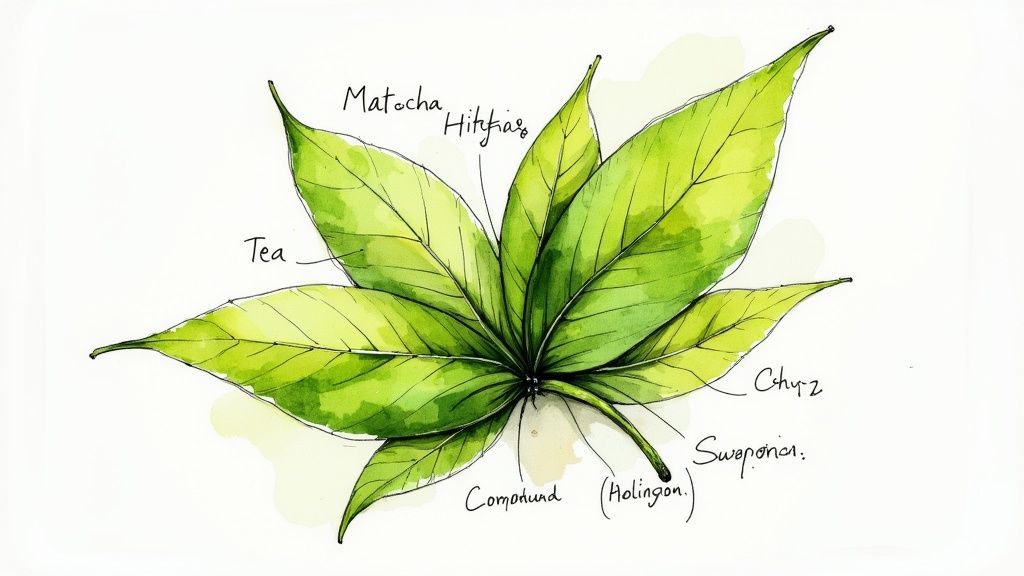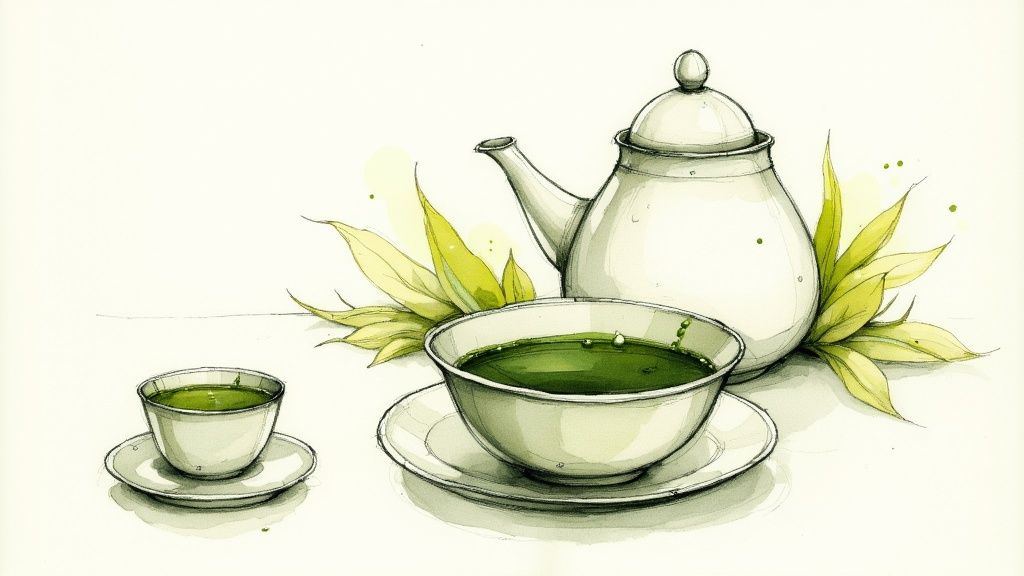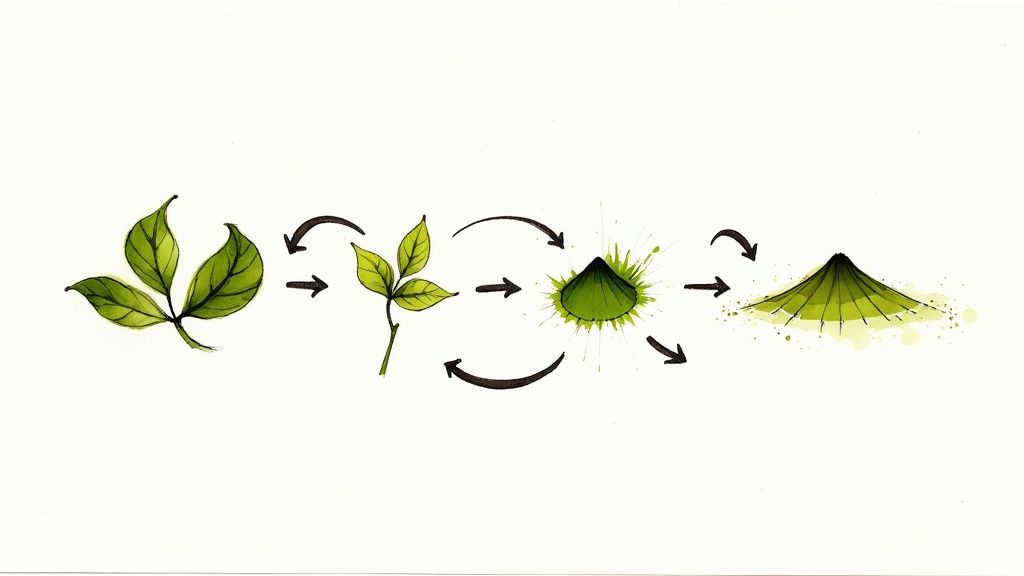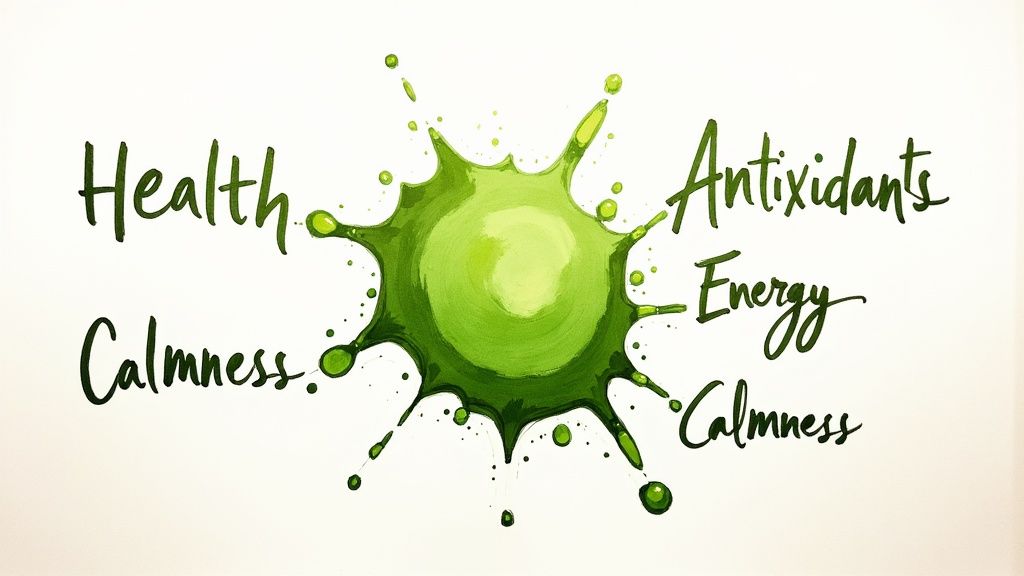Why Modern Wellness Needs Matcha's Ancient Wisdom
Matcha has been a cherished part of Japanese culture for centuries, where this finely ground green tea powder carries deep meaning and purpose. What ancient practitioners understood through experience, science now confirms through research – matcha provides unique health benefits that are especially relevant for supporting wellbeing in our busy lives.
Bridging Ancient Traditions with Modern Research
Zen Buddhist monks first recognized matcha's ability to promote clear, focused attention during their long meditation sessions. Now scientific studies back up these early observations, showing how matcha's natural combination of L-theanine and caffeine helps create mental clarity without the jittery side effects common with coffee. This smooth, sustained energy makes matcha particularly helpful for maintaining concentration and brain function throughout demanding days.
The Power of Whole-Leaf Consumption
The key difference between matcha and regular green tea comes down to how it's made and consumed. Since matcha involves ingesting the entire tea leaf in powdered form rather than just steeping the leaves, you get significantly more nutrients. In fact, matcha contains about 137 times more antioxidants than standard green tea. This high concentration of beneficial compounds, especially the antioxidant EGCG, is what gives matcha its remarkable health-supporting properties.
Matcha's Nutritional Profile: A Modern Marvel
The way matcha is grown and processed adds to its exceptional nutrient content. By shading the tea plants from direct sunlight in the weeks before harvest, farmers boost both chlorophyll production and beneficial amino acids. This careful cultivation method leads to matcha's vivid green color and high levels of L-theanine, which creates a sense of calm focus. Quality-conscious consumers often turn to specialized sellers like matcha-tea.com to source authentic, high-grade matcha that delivers these benefits.
Addressing Misconceptions and Embracing Evidence
While matcha offers many research-backed health benefits, it's important to look at the evidence objectively. Despite some common myths, ongoing scientific studies continue to validate matcha's positive effects on everything from heart health to skin wellness. As research reveals more about this ancient tea's potential, it's clear why matcha remains such a valued addition to modern health practices.
The Real Science Behind Matcha's Antioxidant Power
Looking beyond the hype, let's examine what matcha's high antioxidant content actually means for your health. The numbers tell a compelling story – matcha contains 17.5mg/g of epigallocatechin gallate (EGCG), compared to just 0.05mg/g in regular green tea. But these figures only hint at how this powerful compound works to protect your cells.
Understanding EGCG and its Impact
Think of EGCG as your body's natural defense system. When harmful free radicals threaten to damage your cells – much like rust eating away at metal – EGCG steps in to neutralize them. This protection is particularly valuable given our exposure to environmental stressors that generate these destructive molecules. The way EGCG guards your DNA and cellular structures helps explain why matcha drinkers often report feeling healthier overall.
Matcha's Unique Catechin Composition
While EGCG gets most of the attention, it's just one player in matcha's antioxidant arsenal. The tea leaves also contain epicatechin, epigallocatechin, and epicatechin gallate – each with its own protective strengths. Some target specific cell types, while others excel at neutralizing particular free radicals. Together, they create a more complete shield against cellular damage than you'd get from a single antioxidant source.
Maximizing Antioxidant Absorption
Want to learn more? Check out The health benefits of matcha tea. How you prepare your matcha affects how many antioxidants actually reach your cells. Water temperature makes a big difference – use water around 175°F (80°C) rather than boiling to preserve the catechins. Adding a splash of lemon juice can boost absorption too, as vitamin C helps your body take in more EGCG.
Comparing Matcha with Other Superfoods

Let's put matcha's antioxidant content in perspective:
| Superfood | Antioxidant Capacity (ORAC units per 100g) |
|---|---|
| Matcha | ~1384 |
| Blueberries | ~2400 |
| Dark Chocolate | ~13120 |
While dark chocolate shows higher numbers, it comes with extra calories and sugar that matcha doesn't have. This makes matcha an excellent daily source of antioxidants without unwanted extras. Regular matcha drinking may support everything from heart function to skin health, though scientists are still uncovering all its benefits through ongoing research.
Matcha's Impact on Heart Health and Metabolism
Building on our discussion of matcha's antioxidant properties, let's look at how this green tea powder affects your heart and metabolism. The science behind matcha reveals benefits that go well beyond a morning energy lift.

Supporting Cardiovascular Wellness
Studies show that matcha helps protect heart health in measurable ways. For instance, research has found that men who drink matcha regularly have an 11% lower chance of developing heart disease. This protection comes from several key ingredients working together – the antioxidants, amino acids, and other natural compounds in matcha all help maintain healthy heart function. Making matcha part of your daily routine is a simple step that can make a real difference for your heart over time.
The Role of Matcha in Cholesterol Management
One of matcha's most important heart benefits is how it affects cholesterol levels. The natural compounds in matcha, especially catechins and polyphenols, help lower harmful LDL cholesterol while boosting beneficial HDL cholesterol. These compounds also help reduce inflammation and oxidative damage in blood vessels. By addressing multiple factors that impact heart disease risk, matcha provides well-rounded support for healthy cholesterol.
Matcha and Metabolic Function
The metabolism-boosting effects of matcha come from its unique mix of caffeine and L-theanine. These compounds work together to increase thermogenesis – your body's calorie-burning process. The EGCG in matcha adds to this effect by improving fat burning during exercise. This makes matcha particularly helpful for maintaining a healthy metabolism.
Practical Applications for a Healthy Lifestyle
Getting matcha's benefits is straightforward. Having 2-3 cups daily can lead to real improvements – studies suggest people who drink matcha regularly may lose around 3 pounds over three months. The timing matters too. Drinking matcha before workouts maximizes fat burning, while spacing it throughout the day provides steady energy. For best results, buy high-quality matcha from trusted sellers like matcha-tea.com. Understanding how and when to drink matcha helps you get the most from its heart and metabolism benefits.
The Brain-Boosting Benefits You Can Feel
When we look closely at what makes matcha special, its effects on the brain stand out. Beyond just providing energy, matcha creates a state of clear, focused awareness that can help you think better and get more done. Let's explore how matcha's unique compounds work together to support your mental performance.
The Dynamic Duo: L-theanine and Caffeine
The real magic of matcha comes from how L-theanine and caffeine work together. Unlike coffee, which can make you feel jittery, matcha provides steady, balanced energy. This happens because L-theanine, a natural amino acid in matcha, partners with caffeine to help you stay focused without feeling anxious. Think of caffeine as providing energy while L-theanine helps direct that energy productively. This makes matcha perfect for when you need to concentrate deeply, whether you're working on an important project or tapping into your creative side.
Enhancing Concentration and Creativity
The benefits go beyond simple alertness – matcha actually helps improve how your brain works. Research shows L-theanine increases alpha wave activity in your brain, putting you in an ideal state of alert relaxation. This means you can tackle complex tasks without feeling stressed or overwhelmed. Many people find that matcha helps them think more creatively and make connections more easily. If you're looking to do your best mental work, adding matcha to your routine could give you that extra edge.
Timing Your Matcha for Optimal Brainpower
To get the most from matcha, timing matters. You'll typically feel the effects within 30-60 minutes after drinking it. Many people find morning matcha sets them up for a productive day of work. But since everyone responds differently, pay attention to how late-day matcha affects your sleep. Try having it at different times to discover what works best with your body's natural rhythms and daily schedule.
Integrating Matcha into Your Cognitive Enhancement Toolkit
While matcha is powerful on its own, it works even better as part of an overall healthy lifestyle. Getting enough sleep, eating well, and staying active all help your brain perform at its best. Consider starting your day with matcha in a smoothie or enjoying it as a traditional tea. You can find high-quality matcha products and helpful resources at matcha-tea.com. When you combine matcha with other healthy habits, you create ideal conditions for mental clarity, creative thinking, and sustained focus throughout your day. This balanced approach helps you consistently bring your best mental energy to everything you do.
Beauty From Within: Matcha's Skin Health Properties

The connection between diet and skin health is clear – what we eat directly impacts how our skin looks and feels. Matcha green tea stands out as a natural way to support healthy, glowing skin from the inside out. Let's look at the specific ways matcha helps improve skin health.
Matcha's Antioxidant Shield Against Skin Aging
The antioxidants in matcha, particularly EGCG, play a key role in protecting skin cells. Think of these antioxidants like a shield – they block unstable molecules called free radicals from damaging skin cells. Without this protection, free radical damage shows up as wrinkles, fine lines, and dark spots on our skin. By neutralizing these harmful molecules, matcha helps maintain the collagen and elastin that keep skin firm and bouncy. For example, skin cells are like apples that brown when exposed to air. Matcha's antioxidants work like lemon juice on the apple, preventing that oxidation and keeping skin fresh.
Addressing Inflammation and Skin Conditions
Matcha doesn't just fight aging – it also helps calm irritated skin. Many common skin issues like acne, redness, and eczema stem from inflammation in the body. The natural compounds in matcha help reduce this inflammation, making it especially helpful for those with sensitive or breakout-prone skin. The high chlorophyll content, which comes from growing the tea leaves in shade, also supports the body's natural detox processes for clearer skin.
Practical Ways to Incorporate Matcha for Skin Health
Getting matcha's skin benefits is simple. Start by drinking 2-3 cups of quality matcha tea each day to build up those beneficial compounds in your system. You can also find matcha in skincare products like face masks and creams that let you apply its antioxidants directly to your skin. For the best quality matcha for both drinking and DIY beauty recipes, check out matcha-tea.com.
Combining Matcha with Other Skin-Supporting Nutrients
While matcha is great on its own, pairing it with other skin-friendly nutrients multiplies the benefits. For example, drinking matcha alongside vitamin C-rich foods boosts collagen production for firmer skin. Adding healthy fats from foods like flax or chia seeds helps keep skin hydrated and plump. Try blending matcha into a smoothie with berries and seeds for an easy skin-supporting combo.
Adjusting Your Matcha Routine for Your Skin Type
Different skin types respond best to different approaches with matcha. If you have oily skin, try using matcha masks to help control excess oil. For dry skin types, combine matcha with moisturizing ingredients like hyaluronic acid. Pay attention to how your skin reacts and adjust accordingly. This personal approach helps you get the most skin-enhancing benefits from your matcha routine.
Maximizing Your Matcha Benefits: A Practical Guide

Getting the most out of your matcha requires attention to several key factors. Here's how to optimize your matcha experience, from selecting high-quality powder to proper preparation techniques.
Choosing the Right Matcha for Your Needs
The quality of your matcha makes a big difference in both taste and health benefits. Ceremonial grade matcha, made from young shade-grown leaves, has a bright green color and sweet taste, making it perfect for traditional tea drinking. This grade contains the highest levels of beneficial compounds. For baking or smoothies, culinary grade matcha works well since its stronger flavor blends nicely with other ingredients. When shopping, look for powder with a vivid green color – dull or brownish matcha often indicates lower quality or older product. Check out matcha-tea.com for helpful guides on selecting authentic, high-grade matcha.
Mastering the Art of Matcha Preparation
How you prepare your matcha affects its health benefits significantly. Skip the boiling water, which can damage the tea's beneficial compounds. Instead, use water around 175°F (80°C). While a bamboo whisk and bowl create the traditional frothy cup, a milk frother or shaker bottle works well for everyday preparation. For better absorption of matcha's compounds, try adding a splash of lemon juice – the vitamin C helps your body take in more of the beneficial EGCG.
Timing Your Matcha Intake for Optimal Results
When you drink your matcha matters. For steady energy throughout the day, try spacing out smaller servings. If you exercise, having matcha about 30 minutes before your workout can help with fat burning and stamina, thanks to its caffeine and EGCG content. Just remember to avoid matcha near bedtime if you're sensitive to caffeine.
Proper Storage to Preserve Potency
Like many natural products, matcha loses its punch over time. Keep your matcha fresh by storing it in an airtight container away from light, heat, and moisture. Good storage helps maintain the bright color, fresh taste, and health benefits, making your matcha worth the investment.
Integrating Matcha into Your Lifestyle
Making matcha a regular part of your routine helps you get the most from its benefits. Start small and try different ways to enjoy it – in smoothies, lattes, or baked goods. Visit matcha-tea.com for recipe ideas and new ways to use matcha. With regular consumption, you'll begin experiencing the full range of matcha's health advantages.
Ready to start enjoying better matcha? Check out our selection of authentic Japanese matcha at matcha-tea.com and discover the difference quality makes.
